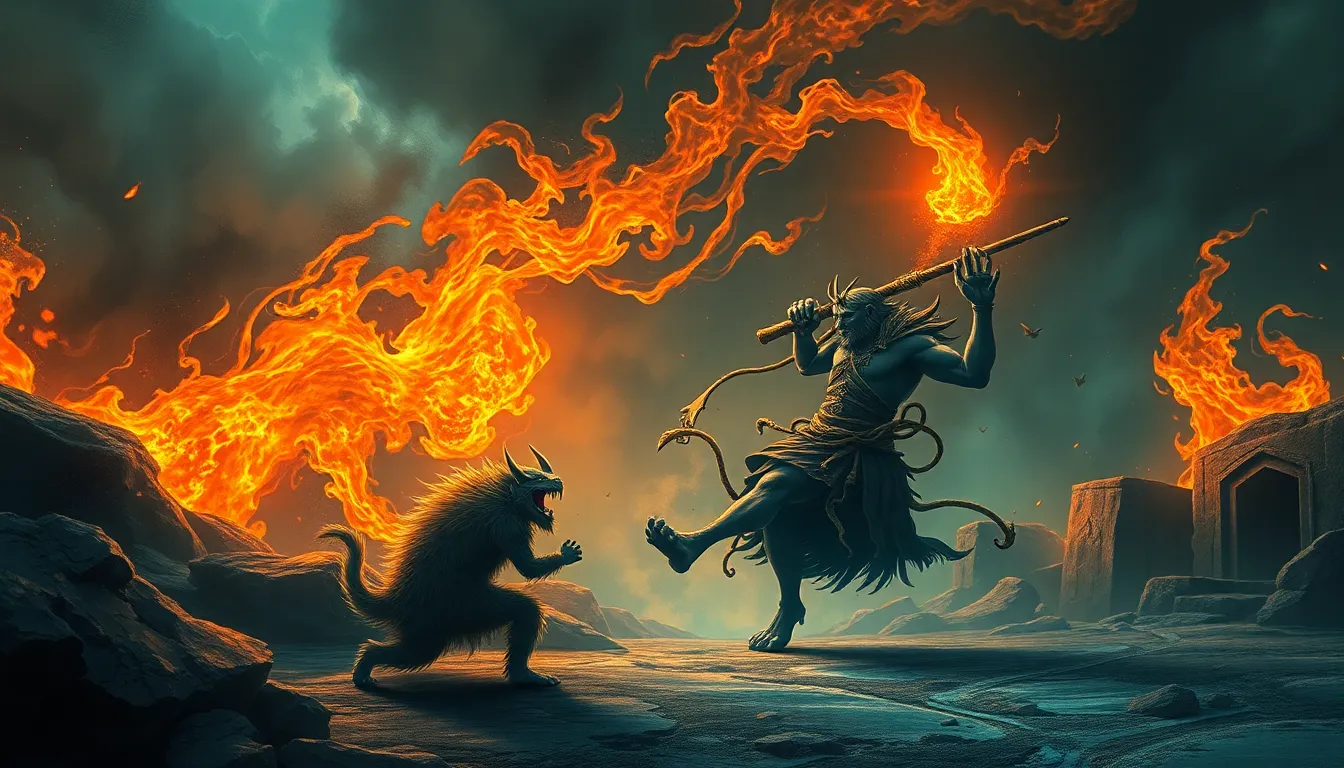Divine Punishments: The Myths That Will Keep You Up at Night
I. Introduction
The concept of divine punishment has been a part of human culture for millennia, transcending borders and binding diverse societies through shared fears and moral lessons. These myths serve not only as a form of social control but also as a means to explain the inexplicable suffering and injustice in the world. They often manifest in the form of cautionary tales, urging individuals to adhere to moral codes lest they face dire consequences.
The psychological impact of these myths can be profound, instilling fear and guilt, and shaping behavior in ways that can lead to both societal cohesion and personal distress. This article aims to explore the historical context, major religious perspectives, and the enduring influence of divine punishment myths, while also examining their implications on personal behavior and societal norms.
II. Historical Context of Divine Punishments
Throughout history, cultures have devised intricate narratives surrounding divine retribution, often rooted in their beliefs and existential questions.
A. Ancient civilizations and their beliefs in divine retribution
1. Mesopotamia
In ancient Mesopotamia, people believed that the gods directly intervened in human affairs, often punishing individuals for their sins. The Code of Hammurabi, for instance, prescribed harsh penalties for wrongdoings, reflecting a belief that justice was divinely mandated.
2. Ancient Egypt
The ancient Egyptians held a complex view of divine justice, believing that one’s heart would be weighed against the feather of Ma’at, the goddess of truth and order. A heavy heart indicated a life of wrongdoing, resulting in the soul’s punishment in the afterlife.
3. Greek and Roman mythology
In Greek and Roman mythology, the gods were known for their capriciousness and often punished mortals for hubris or disobedience. Tales of divine retribution, such as the punishments meted out to Narcissus and Icarus, reinforced the notion that one must honor the gods to avoid their wrath.
B. Evolution of these beliefs through time
As societies evolved, so did their interpretations of divine punishment. The transition from polytheistic to monotheistic religions often shifted the narrative focus from multiple gods to a singular, all-knowing deity, whose justice became a central theme in religious texts.
III. Major Religious Perspectives on Divine Punishments
Different religions provide unique frameworks for understanding divine punishment, each offering insights into moral behavior and the consequences of one’s actions.
A. Christianity: Sin, Hell, and Purgatory
Christian doctrine emphasizes the concepts of sin and redemption. The belief in Hell serves as a deterrent against wrongdoing, while Purgatory offers a chance for purification before entering Heaven.
B. Islam: The Day of Judgment and Hellfire
In Islam, the Day of Judgment is a pivotal event where all individuals are held accountable for their actions. The concept of Hellfire is a powerful motivator for ethical living, instilling fear of divine retribution for those who stray from the path of righteousness.
C. Hinduism: Karma and Rebirth as a form of divine justice
Hinduism introduces the idea of karma, where every action has consequences that may manifest in this life or future rebirths. This cyclical understanding of justice underlines the importance of moral conduct.
D. Buddhism: The concept of suffering and moral consequences
Buddhism teaches that suffering is an inherent part of existence, and moral actions influence one’s path toward enlightenment. The understanding of karma in Buddhism emphasizes personal responsibility and the impact of one’s choices.
IV. Folklore and Mythology: Stories That Haunt
Folklore and mythology abound with stories illustrating the consequences of disobedience and moral failures.
A. The tale of Lot’s wife: A cautionary story of disobedience
In the biblical story of Lot’s wife, her decision to look back at the destruction of Sodom leads to her transformation into a pillar of salt, symbolizing the dire consequences of disobedience.
B. The punishment of Prometheus: Consequences of defying the gods
In Greek mythology, Prometheus is punished for stealing fire from the gods and giving it to humanity. His eternal torment serves as a warning against challenging divine authority.
C. Norse mythology: The fate of Loki and the end of days
Loki, a trickster god in Norse mythology, faces severe punishment for his misdeeds, culminating in his binding until the events of Ragnarök, illustrating the themes of betrayal and the inevitability of divine justice.
V. The Role of Fear in Divine Punishment Myths
Fear is a powerful motivator in the context of divine punishment myths, often serving critical social functions.
A. Psychological implications of fear-based teachings
Fear-based teachings can lead to heightened anxiety and paranoia, as individuals constantly worry about moral transgressions and the potential for divine retribution.
B. The function of fear in maintaining social order
These myths often reinforce social norms, ensuring conformity and discouraging deviant behavior through the fear of consequences.
C. How these narratives shape moral behavior
- Encouraging adherence to societal norms
- Promoting a sense of accountability
- Instilling a sense of community through shared beliefs
VI. Modern Interpretations and Cultural Impact
In contemporary society, divine punishment myths continue to impact literature and media.
A. Divine punishments in contemporary literature and media
Many authors and filmmakers draw on these ancient themes, weaving them into modern narratives to explore moral dilemmas and human nature.
B. The resurgence of fear-based narratives in popular culture
Fear-driven stories, such as horror films and dystopian novels, often echo the motifs of divine punishment, reflecting societal anxieties.
C. Case studies: Movies, books, and religious texts
Films like “The Exorcist” and novels such as “The Road” incorporate elements of divine punishment, exploring the consequences of human actions in a morally complex world.
VII. The Influence of Divine Punishment Beliefs on Personal Behavior
Beliefs in divine punishment can shape individual behavior in profound ways.
A. Guilt, shame, and the moral compass
Feelings of guilt and shame often arise from the internalization of divine punishment narratives, influencing personal ethics and moral decision-making.
B. The impact on mental health and well-being
While these beliefs can provide a moral framework, they can also lead to anxiety and stress, particularly when individuals fear judgment or punishment.
C. Coping mechanisms and resilience strategies
To cope with these pressures, individuals may develop resilience strategies, such as seeking forgiveness, engaging in community support, or redefining their moral frameworks.
VIII. Debunking Myths: The Rational Perspective
As society evolves, so too does the understanding of morality and justice.
A. Psychological explanations for belief in divine punishment
The belief in divine punishment can be explained through psychological theories, such as cognitive dissonance, which suggests that individuals rationalize their beliefs to align with their experiences.
B. The role of science and reason in understanding morality
Scientific advancements challenge traditional beliefs about divine punishment, offering alternative explanations for morality based on human empathy and social contracts.
C. Alternative views on justice and accountability
Modern perspectives advocate for justice systems rooted in rehabilitation rather than retribution, emphasizing accountability without the fear of divine punishment.
IX. The Future of Divine Punishment Myths
The landscape of belief in divine punishment is changing, particularly in increasingly secular societies.
A. Changing beliefs in a secular world
As secularism rises, many individuals are re-evaluating traditional beliefs about divine punishment, seeking more rational and humanistic approaches to morality.
B. The potential for new narratives and interpretations
New narratives may emerge that focus on personal responsibility and social justice, moving away from fear-based motivations.
C. The ongoing relevance of these myths in a diverse society
Despite changing beliefs, divine punishment myths continue




